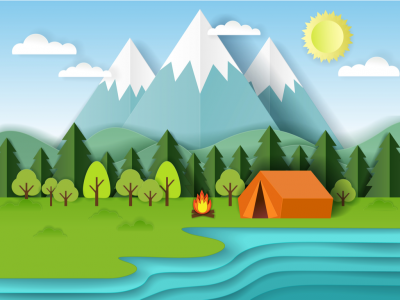
Create a DIY Summer Camp at Home
Want a more budget-friendly and homespun way to let your children enjoy summer camp benefits without the downsides of a sleepaway camp? This summer, in particular, many summer camps are suspended, and parents are looking for ways to keep their kids engaged. Here are a few tips to help you create a fun and fantastic summer camp!
Set a Schedule
First, decide how long you want to run your camp. Will it be for one week, one month, or all summer? Will each day of camp be a few hours or all day?
Get your children’s input. The length of your camp will depend on your kids’ ages and how much time and energy you want to devote to the experience.
Plan Your Activities
Most traditional summer camp programs operate on a schedule built on different types of fun, physical, and educational endeavors. When creating your schedule, mimic their approach with an engaging variety of pursuits, including categories such as:
1. Outdoor Sports and Games
Camp is a time to get outside, play some games, learn new skills, and burn lots of excess energy. Talk with your children about which activities they would most enjoy and the new skills they’d like to master. Make a list, adding a few ideas of your own.
New skills might include learning to swim, ride a bike, or hit a softball. Maybe they want to master a jump rope, hula hoop, or pogo stick. Your summer camp is the perfect time and place to help your little ones learn valuable new skills while prioritizing physical activity.
2. Mental Magic
Children love to learn new things, particularly if they already have a keen personal interest. Brainstorm ideas with your kids. Create a list of stimulating stuff they would like to read, learn, and do to help them explore the world and express themselves verbally or in writing.
Maybe your children want to learn about the solar system, or dinosaurs, or how to grow vegetables and flowers. Maybe there’s a book they have wanted to read (or one you particularly want them to enjoy).
You might want to include science projects, like a study of how light refracts, how a volcano works, or how to create invisible ink.
Your camp’s intellectual pursuits will depend on your children’s age, interests, and the things you think they will most enjoy learning. Mix and match topics. Each undertaking could end in a short written report, a videotaped demonstration, or a verbal presentation.
3. Arts and Crafts
Summer camp is a perfect time for artistic expression and honing fine motor skills. If your children enjoy arts and crafts, be sure to include a variety of activities like paper lanterns, wind chimes, pasta necklaces, and paper plate frisbees.
The internet is loaded with ideas and many craft materials are inexpensive and easily sourced from your home.
4. Help on the Home Front
Don’t feel like household chores should be ignored, just because you’re doing summer camp. Include a couple of 15-minute tasks in your daily schedule. It will help improve your home environment while also teaching your children domestic skills they will need as adults.
It’s never too early to start. And mixing these chores into other summer camp activities will make it painless.
Possibilities include dusting a room, washing dishes, taking out the trash, running the vacuum cleaner, or weeding a flower bed. You may want to teach them how to properly clean a bathroom, make their beds, do laundry, or cook a meal.
5. Family or Group Activities
If you want to include friends in your summer camp activities, pick one time of the day, or one day per week when your children can invite friends to join. If you prefer to keep it closer to home, be sure to schedule time when children and parent(s) are all involved in an activity.
These group activities are an opportunity to interact, build bonds, and hone relationship skills. This could be a movie night, but a more interactive group activity would be an outdoor adventure, a board game night, playing a game in the yard, or even cooking a meal together.
6. Water and Adventure
It’s just not summer without the ability to play in the water. Whether you hook up a sprinkler in the backyard or make a trip to a local pool, lake, beach or a water park, it’s essential to include some quality water time in your summer camp experience.
Outdoor adventure activities could be anything from camping out in the backyard to navigating the nearby woods, learning a bit about birdwatching, identifying constellations (with or without a telescope), collecting bugs, identifying wild plants or going to the zoo.
An Awards System
To acknowledge your children’s work and accomplishments during their summer camp activities, consider structuring your camp so they can earn points that can be “cashed in” for something they want to do, like a trip to a theme park, or a multi-day camping trip.
You may also want to make award certificates and distribute them in a final camp session, where you acknowledge your children’s individual contributions and the shared highlights of your summer camp experience.
